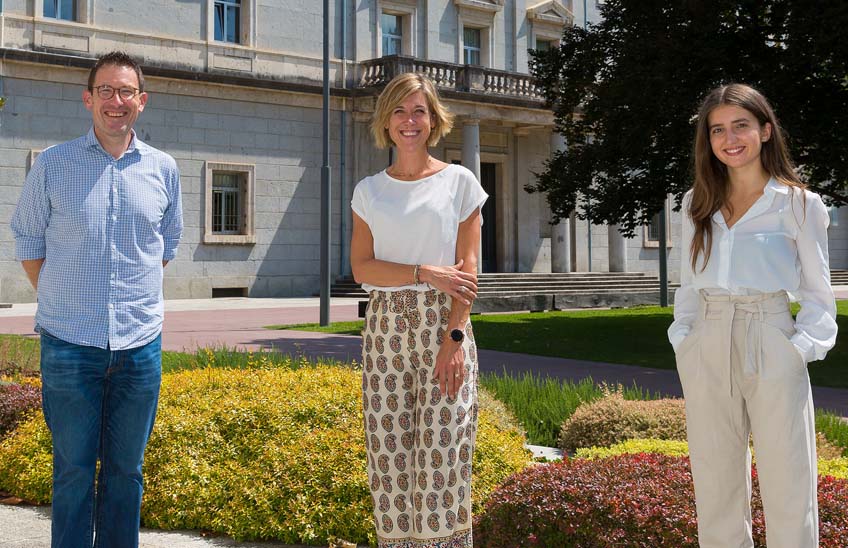The University and the Eunate Association sign a agreement for the development of a project with children with cochlear implants.
Funded by Innovasocial, Fundación Caja Navarra and Fundación La Caixa.

FotoManuelCastells/Mark Gibson, director of laboratory del Habla; Rebeca Ballesta, manager of the Family Care and Support Service of the Eunate Association; and Miriam Huárriz, collaborator of laboratory del Habla.
30 | 07 | 2021
The University and the association Eunate de Familias de Personas Sordas de Navarra have signed a agreement of partnership for the management and execution of the project "Escucho, veo y hablo", aimed at children with cochlear implants. The goal of the study, financed by Innovasocial, Fundación Caja Navarra and Fundación La Caixa, is to evaluate the effectiveness of speech therapy treatments for the phonological development of children with cochlear implants using ultrasound. With a duration of one year, the project will be developed in the laboratory of the Speech of the School of Philosophy and Letters of the academic centre.
As Professor Mark Gibson, director of laboratory and one of the coordinators of project, explains, "in order to promote the correct learning of speech, we want to measure in a methodological, experimental and scientific way the effectiveness of the different interventions and activities carried out by the children, as speech therapy often works by intuition". He also points out that, to date, "no institution in Spain has assessed the speech production of children with cochlear implants in terms of the precision of articulatory movements by means of an ultrasound study".
goal Thus, from July 2022 to 2023, the speech of the participants in project will be documented, with the aim of helping parents to know the phonological development of their children. The results of the study will also help to evaluate different protocols and intervention techniques that are being used by speech therapists, with the intention of improving them and that these professionals can have access to a guide of good practices that they can apply to other children. On the other hand, the conclusions will be useful to better understand the characteristics of speech that are well transmitted by implants. "At the end of this and another project we have underway, we also want to develop an app based on sound, scientifically validated interventions that children can use at home and improve faster," adds Gibson.
Rebeca Ballesta, manager of the Family Care and Support Service of association Eunate, pointed out that "years of experience have shown us that a deaf person, even if they use hearing aids or implants, has difficulties in correctly discriminating some phonemes, as the auditory quality provided by resource never matches that of a healthy ear. Working together with laboratory Speech to improve the articulation of our users will minimise these difficulties and improve their expression and speech, thus supporting their development educational and social skills".
In this sense, Miriam Huárriz, a graduate in Philology and Journalism from the University and collaborator of laboratory, affirms that thanks to these resources, "a lot of progress has been made in the development of research that facilitates the inclusion of the deaf community, but there is still a lot to be done". She also stresses that having funding to develop this project "is a validation that what we do has a real and positive impact".
